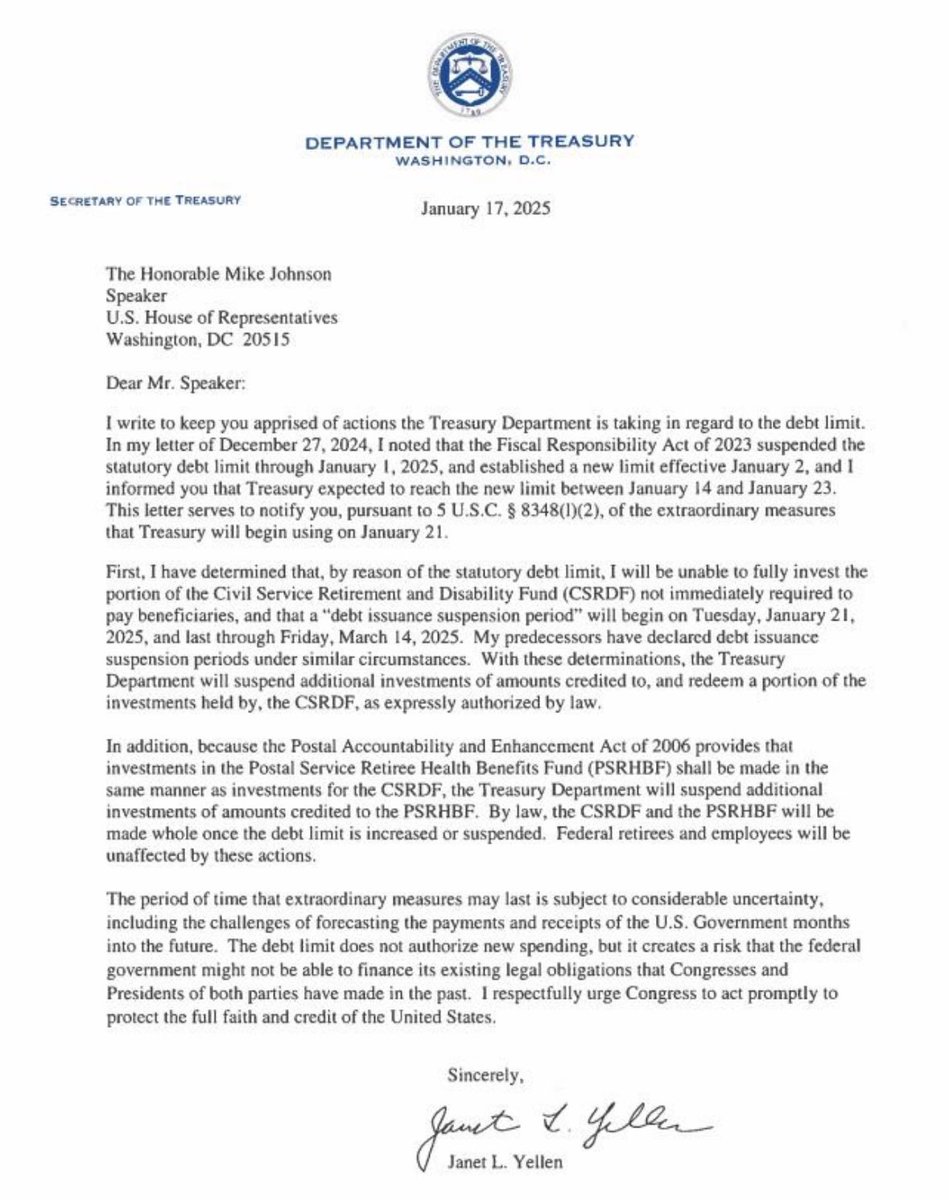In one of her last acts as Treasury Secretary, Janet Yellen announced that the Treasury will start taking “extraordinary measures,” or special accounting maneuvers intended to prevent the nation from hitting the debt ceiling, on January 21 in a letter sent to congressional leaders Friday afternoon.
Her announcement that the U.S. will hit its debt limit on January 21st, necessitating “extraordinary measures,” comes at a particularly telling time – as the first significant financial challenge for the new administration.

As Janet Yellen exits her role as Treasury Secretary, she leaves behind a shattered financial landscape fraught with challenges for the incoming Trump administration. Yellen’s final act was to warn Congress that the U.S. would hit its statutory debt ceiling on January 21st, the day after the Inauguration, necessitating the use of “extraordinary measures” to avoid default. This move highlights the ballooning national debt under her tenure, with critics arguing that her policies contributed to fiscal irresponsibility by not pushing for significant spending reforms.
Trump, stepping into office, will face immediate pressure to address this debt ceiling issue. With the debt ceiling already reinstated and the Treasury’s cash reserves dwindling, Trump will need to navigate:
- Debt Ceiling Negotiations: The new administration must either convince Congress to raise or suspend the debt limit, a task complicated by partisan divides and potential demands for spending cuts or policy concessions from Congress.
- Economic Stability: Maintaining investor confidence in U.S. Treasuries amidst political uncertainty. Any delay or drama around the debt ceiling could lead to higher borrowing costs and affect financial markets.
- Fiscal Policy: Balancing the need for fiscal discipline with the political realities of a divided government. Conservatives will push for an audit of the Federal Reserve’s actions and a return to fiscal conservatism, potentially clashing with other political agendas.
Yellen’s departure marks the beginning of a critical period for fiscal policy under Trump, where the management of the national debt, alongside debates over government spending and monetary policy transparency, will set the tone for his economic stewardship.
Fortunately, Scott Bessent, the Trump nominee is an adult who understands the situation, knows it has been caused by spending and will hopefully, save the nation from default and embarrassment.
He said at his Congressional inquisition:
America must implement pro-growth regulatory policies, cut wasteful federal spending, and unleash American energy production.
“Today, I believe that President Trump has a generational opportunity to unleash a new economic golden age that will create more jobs, wealth, and prosperity for all Americans.”
“We must secure supply chains that are vulnerable to strategic competitors, and we must carefully deploy sanctions as part of a whole-of-government approach to address our national security requirements, and critically, we must ensure that the US dollar remains the world’s reserve currency.”
“The federal government has a significant spending problem, driving deficits that have averaged a historically high 7% of GDP during the past four years. We must work to get our fiscal house in order and adjust federal domestic discretionary spending that has grown by an astonishing 40% over the past four years.”
“Productive investment that grows the economy must be prioritized over wasteful spending that drives inflation.”
“If Congress fails to act, Americans will face the largest tax increase in history, a crushing 4 trillion tax hike. We must make the 2017 tax cuts and Jobs Act permanent and implement new pro-growth policies to reduce the tax burden on American manufacturers, service workers, and seniors.”
“The best approach to achieving these important goals together, as President Trump has said: We will unleash the American economy by implementing pro-growth regulatory policies, reducing taxes, and unleashing American energy production.”
Treasury Secretary-designate Scott Bessent: “We do not have a revenue problem in the United States of America, we have a spending problem… This spending is out of control.” pic.twitter.com/UmArPAt2Nw
— Trump War Room (@TrumpWarRoom) January 16, 2025
Help American Liberty PAC in our mission to elect conservatives and save our nation. Support – American Liberty PAC
